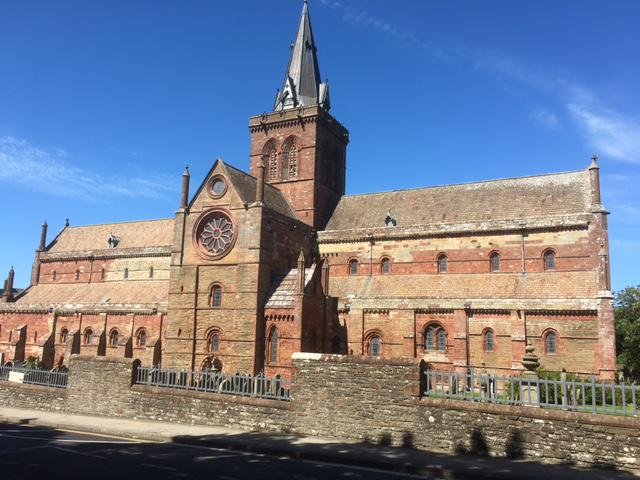The St Magnus Festival 2022
It is such a delight to be able to attend a live festival these days, and a particular pleasure to be back at a full-scale St Magnus Festival in the Orkney Islands. Any concerns that two years of limited performance opportunities might have dulled the edge of the performers were quickly dispelled by the two youthful ensembles presenting three excellent concerts of early music.
My St Magnus Festival opened significantly with the strains of Sibelius, played by the RSNO, but the first of my three concerts with HIP elements was given by Tenebrae in St Magnus Cathedral. Directed by Nigel Short, the six singers presented a jubilee programme featuring music from the times of Elizabeth I and II. The wonderfully focussed sound simply glowed in the cathedral’s rich acoustic, and a first half of Lassus, Bennet, Gibbons, Tallis, Weelkes, Morley and Byrd was beautifully engaging. The Gloria and Agnus Dei from Byrd’s four-part Mass were particularly impressive, and clever use of the two soprano and bass voices allowed for alternating solo and tutti textures. If the two madrigals from The Triumphs of Oriana sounded a little breathless, this was perhaps partly due to the acoustic. I applaud the idea of dispensing with applause until the end of the entire programme, allowing this magnificent music to have a cumulative impact, although the odd decision to sound out the notes on a piano seemed curious – surely some more unobtrusive way of establishing pitch could have been devised?
The second half of the concert consisted of music from the lifetime of our own monarch, although My soul, there is a country, probably the finest of Sir Hubert Parry’s remarkable Songs of Farewell which concluded the concert predates even her long life. Walton’s Set me as a seal underline this composer’s underrated skills as a composer of a capella choral music, while Britten’s Dances of Gloriana from the Masque at the opening of Act II of his opera were sung with poise and elegance, with the group’s director contributing vocally at one point to allow for a four-part male voice texture. Two madrigals by Morten Lauridsen, more harmonically edgy than his poignant church music, acknowledge a debt to Carlo Gesualdo, and it was nice to return to the rich and beautifully crafted world of Edwardian harmony for the concluding Parry. In response to a thoroughly well-earned ovation from a substantial audience, the group performed Evening Prayer by Joanna Marsh, a hauntingly beautiful encore – as Nigel Short pointed out, ending a lunchtime concert with an evening prayer may seem perverse, but the Cathedral’s timeless ambience and Orkney’s late June ‘simmer dim’ rendered such niceties moot.
The four-part recorder consort Palisander provided the balance of the early fare this year, and their first concert, You make me feel like dancing, also in St Magnus Cathedral was a superbly slick production featuring music from the Renaissance and more recent times, as well as song, dance and narration. The four young ladies played a wide range of Renaissance and modern recorders from contrabass to garkleinflöte with awesome technical virtuosity and a stunning degree of ensemble, and their enthusiasm for the music was infectious. In the course of their two performances, they gave clear and accessible explanations of their instruments, while the talents of Miriam Monaghan as arranger of much of the music were another decisive factor in the success of both programmes.
The contemporary music, some of which was composed specifically for the group, such as Delyth Naya’s impressively inventive Kagura Suite and Jacob Fitzgerald’s mesmerising Murmuration, made stunningly original use of the recorders and their articulation. The Renaissance music was also exquisitely played. I have some reservations about the group’s penchant for presenting isolated random phrases staccato – we have little idea as to how contemporary performers approached the music, but by contrast the sombre dignity of Pallisander’s no-nonsense account of Thomas Tomkins’ Pavan in F Major was simply spell-binding. Subtle ornamentation enhanced all of these performances, while veritable blizzards of virtuoso passagi, such as those in Merulas’s Canzon Seconda, were simply astonishing.
The group’s second concert, an afternoon event in the atmospheric 18th-century ‘fisher kirk’ of St Peter’s Sandwick spectacularly set on the shore of the Bay of Skaill proved an equally stimulating delight entitled Double, double toil and trouble and incorporating things supernatural. In the smaller acoustic of the kirk, it was easier to hear the individual timbres of the instruments, and again the show flowed with a wonderful lucidity and consummate virtuosity. Once more Miriam Monaghan’s skills as arranger proved crucial, making available a rich variety of musical styles. While a slightly arch rendition of Vivaldi’s Concerto La Notte found me writing ‘poor Vivaldi’ in my programme, other Baroque reworkings including a 7-part account of Tartini’s Devil’s Trill Sonata proved more convincing. Tenebrae had relied on their director to increase the number of parts – Pallisander simply played two recorders each! By this time we were delighted but not surprised at such feats of versatility. A healthy audience had made their way to this atmospheric outpost on Orkney’s wild west coast, and after enthusiastic and sustained applause, at least one audience member made his way to the beach to enjoy the warm sunshine with an impromptu swim in the surf.
Chatting to the Festival Director Alasdair Nicolson in the magnificent setting of Kirkwall’s St Magnus Cathedral before the Tenebrae concert, the courage and enterprise required to restart the festival became apparent. Alasdair and his committee are to be applauded for staging against considerable headwinds such a varied programme of first-class performances. Orkney is a magical place, but in June it is all the richer for the welcome return of the St Magnus Festival.
D. James Ross
This PDF version has more photos: St Magnus Festival 2022
